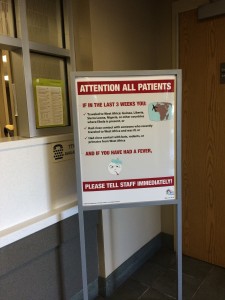
Ebola is a rare and deadly disease first reported in 1976 in the Democratic Republic of the Congo. Its symptoms, which include fever, severe headache, muscle pain, weakness, diarrhea, vomiting, abdominal pain and unexplained bleeding or bruising, may appear anywhere from 2 to 21 days after exposure to the virus. The disease is often fatal, especially if untreated.
So far, Ebola cases have been extremely rare in the U.S., with none reported in California. Even so, Tulare County health officials and care providers have been working to be prepared… just in case.
“We’ve prepared as if it’s a certainty,” said Lindsay Mann, CEO of the Kaweah Delta Health Care District. “If we have a case here, we’re ready.”
“Kaweah Delta Medical Center has been updating staff regularly on the outbreak and recently re-evaluated readiness for handling patients with Ebola,” reported Daniel Boken, M.D., medical director of infectious diseases at Kaweah Delta Medical Center, in a release issued by the center. “The CDC expects all hospitals to be able to handle these cases until outside assistance arrives. The KDMC Infection Prevention Team has been working with various hospital disciplines to assure a readiness plan is in place.
“The team has provided updates to staff since July, and will continue to send updates as needed based on official communications from federal, state and local health officials,” he continued. “Recently, the team prepared education for staff demonstrating correct procedures for putting on and taking off protective gear. Additionally, an executive approval has been obtained so that in the event that there is an Ebola patient in our care, additional staff will monitor those entering or exiting an isolation room to assure that safe practices are performed.”
“We are prepared to handle patients who have Ebola,” echoed Melissa Janes, infection prevention manager at Kaweah Delta Health Care District. “If we should receive a patient today, we have rooms in emergency, but the endoscopy suite is most likely where we will place a patient.”
Kaweah Delta has accumulated an inventory of personal protective equipment for its staff, including hoods, N95 respirator masks, goggles, face shields, Level 3 fluid-resistant gowns, aprons, gloves with extended cuffs, and boot covers. Acquiring some of these items was a challenge, according to Janes. “Every other hospital in the United States wants the same kind of equipment,” she said.
Kaweah Delta’s plan calls for it to transfer any Ebola patients to a facility that has a higher level of isolation units, said Janes. University of California medical centers in Irvine, San Diego, Los Angeles, Davis and San Francisco have such facilities.
“As part of a public university, UC’s medical centers are far along in their preparation activities and are willing to care for confirmed Ebola patients,” said Dr. John Stobo, UC senior vice president for health sciences and services. “Stepping up to a public health crisis is what these medical centers do, and in the past weeks we have been actively readying ourselves for any health eventuality related to Ebola.”
Kaweah Delta has been receiving a lot of education on the disease, which it shares with its residents and with all physicians who serve it. The information helps identify Ebola symptoms, including the key questions to ask patients, such as if they have travelled to Guinea, Sierra Leone or Nigeria in the past 21 days.
Local health officials continue to watch for updates about Ebola. The United States Centers for Disease Control and Prevention (CDC) may make changes to their recommendations about how to deal with the disease.
“Things happen and it changes course,” said Janes. “CDC is doing the best job it can.”
But what if Ebola arrives in Tulare County, not as a single patient, but as an outbreak?
“First of all, there’s not going to be an outbreak,” said Tulare County Health Officer Karen Haught, M.D. “That’s because of our public healthcare system. Hospitals here are very prepared. Africa has a very different environment.
“I think people in Tulare County should not worry that they’re going to get sick with Ebola,” added Haught, who was asked how easily the disease could spread if someone in the county became infected and went out in public. “If a person is exposed but doesn’t have symptoms, that person is not contagious. We have an active monitoring system. Anyone exposed will be tested twice a day.”
The county effort includes working together as a team, with everyone understanding their role and the protocols for dealing with Ebola.
“We work collaboratively,” said Haught. “My responsibility is to oversee the monitoring of any persons who returned to Tulare County from West Africa.”
If those who have been in West Africa recently show symptoms, Haught helps coordinate their testing. She also works to ensure that local healthcare providers have the most current information about Ebola.
“We’re meeting with hospitals and the California Department of Public Health on a regular basis,” she said.
